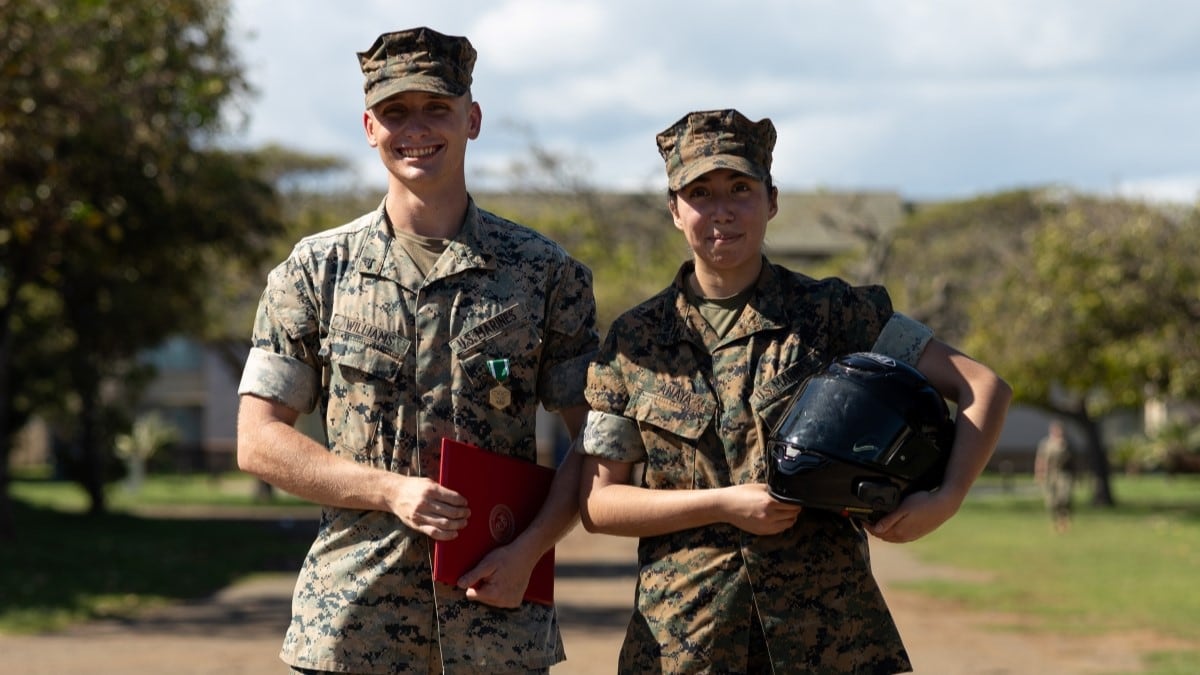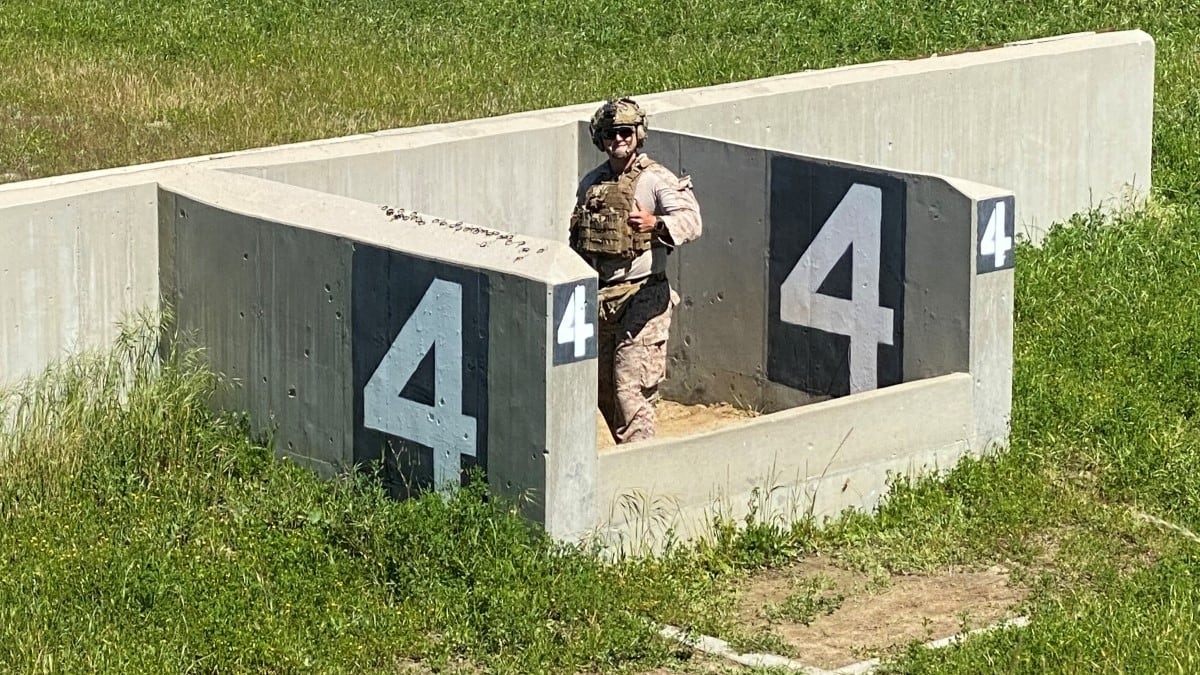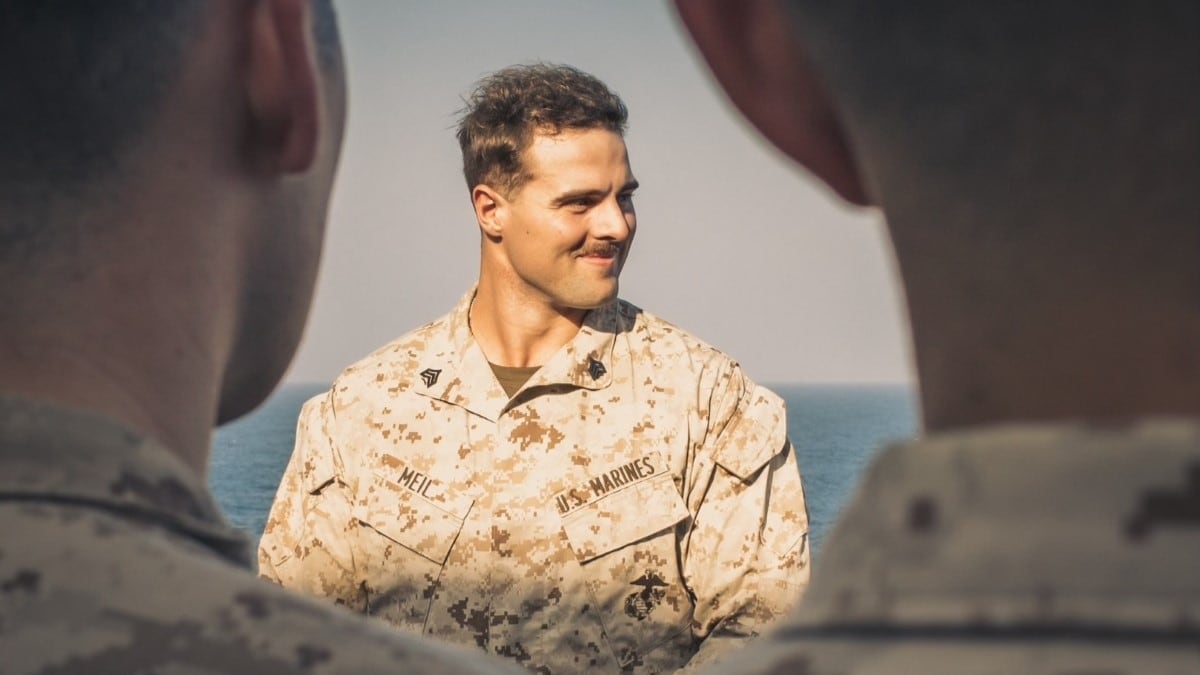When then-Sgt. Brett Meil saw one of his students inadvertently activate a grenade during Marine infantry training in June 2023, he yelled at him to toss the grenade into the target area.
But the student froze with fear. In between three seconds and five seconds, the grenade would have exploded in the young Marine’s hand.
Meil yanked the student out of the training pit and swatted the grenade out of his hand. Unfortunately, it bounced off a wall and landed near the two of them.
So Meil covered the student with his body and prepared to die. He was sad for his wife, whom he had married 11 days prior.
Meil, 26, who survived the blast with extensive injuries, said in an interview with Marine Corps Times he acted out of a sense of obligation to his students.
“I look at these students as like my little brothers,” said Meil, who now is a staff sergeant.
RELATED

Brotherhood was what drove Meil to enlist in the Marine Corps in the first place. He grew up in Texas, where football “is basically a religion,” and had the importance of camaraderie drilled into him as he played the sport, he said.
As a high school senior in 2016, Meil got a call from a Marine recruiter soon after he’d heard that a college scholarship wouldn’t pan out.
They got lunch. Meil completed the enlistment process within 72 hours, he said.
After attending boot camp in 2016, Meil became a rifleman, spending time in Hawaii, Japan and California, as well as deployed with the 11th Marine Expeditionary Unit.
In October 2022, he started Marine combat instructor school at Camp Pendleton, California.
A few days before his graduation, his own instructors took him and the other soon-to-be combat instructors on a steep sunrise hike up one of the base’s big hills, Old Smokey.
At the top of the hill, Marines in the school received “halos,” elastic helmet bands with their names on them.
One of the school’s instructors told the Marines, These halos don’t put you before the students — they represent your role as their guardian angels, who must put the students first.
“That could have been hogwash, but I kind of took it to heart,” Meil said.
His goal as a combat instructor at California’s School of Infantry–West is to train young Marines to be ready should they have to go to combat, he said. He also serves as a mentor who models what a squad leader would be like in the fleet.
June 13, 2023, was supposed to be a typical day for him and his students on the grenade range, Meil said.
But one of Meil’s students messed up the order of the steps he was supposed to take before throwing the grenade, Meil said. The grenade’s safety lever dislodged.
After shielding his student from the blast, Meil awakened to his friends tending to him. He was taken to a hospital in the same ambulance as the student whose error could have cost him his life.
At first, Meil said, he was furious at the student, who had sustained only minor injuries. Then Meil, who is Catholic, felt “the peace of God” come over him.
“I was like, ‘You’re alive, I’m alive — we’re good, man,’” Meil recounted.
Meil said the care he received at the civilian hospital was so lacking — for instance, providers refused him pain meds — that he left after four hours, and ended up embarking on his recovery on his own couch.
He had 20 pieces of shrapnel throughout his body, including two in his nostrils, and a severe traumatic brain injury, he said. It should have taken him about a year to recover.
But with support from his wife and his leaders, and with an array of therapies, Meil was back training infantry students within six months.
Meil said the student whose life he saved was dropped from his class but completed infantry training with another class. Before he graduated, Meil told him: Your life was saved, and you need to be better for it. You need to be the most squared-away Marine you can be.
Meil said he hasn’t heard from the young Marine since.
Immediately after the incident that injured Meil, Marine Corps Training Command halted all live grenade training to allow for a safety investigation and review of standard operating procedures, according to Marine Corps Training Command spokesman Maj. Joshua Pena. The training resumed in January, Pena said.
There were no other mishaps involving live grenades in 2023 within Training Command, according to Pena.
In March, the United Service Organizations named Meil its Marine of the year.
“Brett’s unwavering courage and decisive actions in the face of personal risk exemplify the highest standards of conduct expected of Marines,” the USO wrote in a post about its service members of the year.
Meil said his command also has put him forward for a Navy and Marine Corps Medal, the Corps’ top award for noncombat heroism. Pena told Marine Corps Times he couldn’t comment on pending awards.
Meanwhile, Meil is still a combat instructor, and he still loves it.
On April 3, he went with his 16 students to the grenade range, for the first time since the blast.
Meil, who said he still experiences post-traumatic stress from that day in June 2023, made a beeline for the same pit from which he had scooped the student. He felt he had to conquer it.
His heart was racing. But another instructor threw alongside him first, and then he felt fine.

Meil threw. His 16 privates threw.
“It was good for me to get back on that horse,” Meil said.
Irene Loewenson is a staff reporter for Marine Corps Times. She joined Military Times as an editorial fellow in August 2022. She is a graduate of Williams College, where she was the editor-in-chief of the student newspaper.









